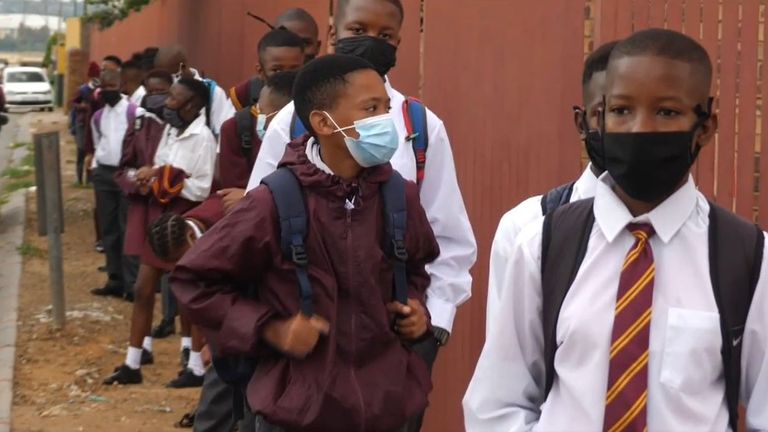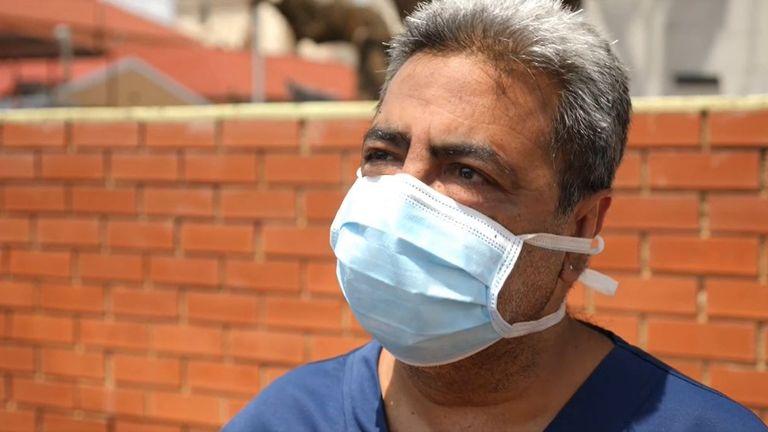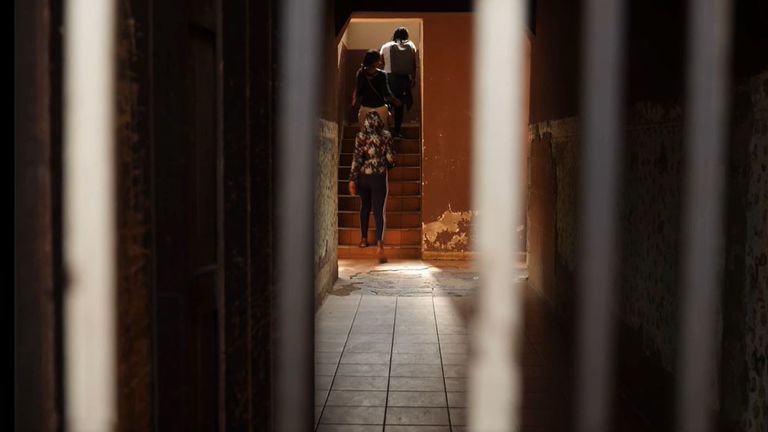When South Africa's hardy yet overworked health system shifted to address the COVID pandemic, the work of diagnosing people with HIV - and maintaining contact with those who already have the virus - was neglected.
As the Omicron variant continues to sweep the world, registering a record number of infections in Japan, Russia and Romania amongst others, the country where the strain was first documented is now preparing to bid it goodbye.
Omicron was first picked up by technicians in a laboratory in South Africa. A few weeks later, a handful of doctors at the main hospital in the country's capital, Pretoria, provided the first analysis of its behaviour after admitting dozens of new COVID patients.
It was at that point that Steve Biko Academic Hospital's Dr Fareed Abdullah told the world that Omicron was not like the variants which fuelled previous waves.
Live COVID updates from UK and around the world

Image:
The strain was highly infectious but it was significantly less likely to put people in hospital - or cost them their lives. Major studies in the UK and US on the severity of the disease have confirmed these initial observations made in South Africa.
"Are we closer to the end of this wave than the beginning?" I asked.
"The data is showing that we're right at the end of the wave, our case rates are almost where they were pre-wave level, we really have a view now of the whole wave and can describe it properly," said Dr Abdullah, as he stripped off his protective garments outside the hospital's ICU ward.
Yet there is another issue now concerning this clinician and the rest of the medical community in South Africa.
Seroprevalence surveys indicate that more than three-quarters of the population have already generated immunity from previous COVID-19 infections - one reason why Dr Abdullah and others think the fall-out from Omicron was relatively mild.
However, there is one group who are thought to be at particular risk - any of the millions of people in South Africa who suffer from weakened immune systems, like those with HIV.
HIV is a key public health concern in South Africa with an estimated eight million people (13% of the population) living with the disease. There is tried and tested medicine for this, called antiretrovirals. It keeps HIV at bay, thereby allowing the body's immune system to function normally. But patients need to take the medication consistently.
When South Africa's hardy yet overworked health system shifted to address the COVID pandemic, the work of diagnosing people with HIV - and maintaining contact with those who already have the virus - was neglected.
Public health organisations like Right to Care estimate that some 3.6 million have either gone undiagnosed or are not currently on a consistent antiretroviral regime.
"In South Africa, we want to make sure that more and more people with HIV get into treatment so they don't fall into that category, but in my humble opinion, that is where the epidemic is shifting now," says Dr Abdullah.
Finding and reintegrating those carrying the HIV virus into the system is just one part of the challenge however.
New strains could evolve
Early on in the pandemic, scientists discovered that the immunocompromised tend to suffer from particularly long and severe COVID infections with prolonged periods of infectiousness.
In addition, work done by scientists in Durban has shown how COVID can mutate inside the bodies of those with untreated HIV. In one case, they traced a coronavirus sample to a 36-year-old HIV patient who was struggling to adhere to her antiretroviral treatment regime. Over the course of her seven-month COVID infection, the virus acquired 32 mutations.
The risk is clear. New variants of concern could evolve - and be transmitted - by those with weakened immune systems.
"It means a major reorganisation of the health service because these people are difficult to find. How do you make the diagnosis in these people? But that is where modern medicine has to take us, rapidly," says Dr Fareed Abdullah.
In a town called Klerksdorp in South Africa's North West Province, health workers are trying to re-establish contact with dozens of HIV patients who have fallen off the local health authority's radar.
'I was so sick'
A 40-year-old woman called Sylvia van Wyk stopped taking antiretroviral tablets two years ago - and when she picked up COVID, she couldn't get rid of it.
"I was so sick, I couldn't do nothing, nothing at all, my mum was there for me, she was washing me, feeding me, I couldn't do nothing for myself, nothing," she said.
Sylvia had COVID for three agonising months but when she re-started her HIV treatment, her body fought the virus off.
"Why did you stop taking (your antiretrovirals)?" I asked.
"Truly speaking, I was entertaining too much, I was entertaining, I wasn't taking care of my health," she said.
South African scientists warn that it is crucial that people like Sylvia continue to take their HIV treatments for fear of the development of some, "really nasty variants," in the words of one leading figure.
It will require a determined pivot from an already-exhausted health service but our collective health may depend on it.
Source : Sky News


